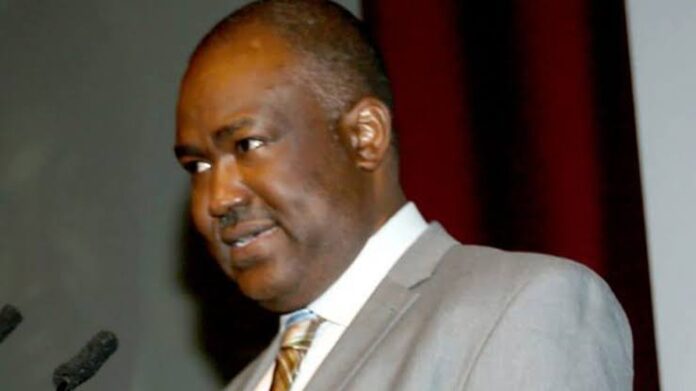Corrupt Nigerian leaders looted 440 billion dollars from 1966 to date, says former presidential aspirant
Former presidential candidate of the People’s Trust Party (PTP) Gbenga Olawepo Hashim who later decamped to the ruling All Progressive Congress (APC) has said that a total of 440 billion US dollars have been looted by corrupt Nigerian leaders from 1966.
Hashim who was the guest speaker on the topic, “Uthman Dan Fodio: A legacy of Anti-Corruption”, organised by Arewa House in Kaduna State, said however, First Republic leaders were not among those corrupt leaders because, according to him, ‘they lived austere lives and they were saints.’
He noted that the military coup in January 1966 opened the floodgates of corruption in the country, saying that many decades after the murder of some of the First Republic leaders, no leader of comparative integrity have worked for the progress of the country.
The APC chieftain recommended the anti-corruption legacy of Sheikh Uthman Dan Fodio which, according to him, ‘are quite relevant to the present day Nigeria if, and only if we desire to seek any possible and meaningful change.
“Between 1966 and now, state actors in Nigeria have siphoned over $440 billion in loot from the treasury. This is six times the Marshal Plan – the sum total needed to rebuild devastated Europe in the aftermath of the Second World War.
“Following independence in 1960, most of the early political leaders had very austere lifestyles. Mostly transparent and disciplined political leaders such as Sir Ahmadu Bello, neither built grand mansions with public wealth nor accumulated unexplainable wealth. That was also the standard lifestyle of Malam Aminu Kano…
“The army through a coup in January 1966 overthrew the independence government in Nigeria. One of the excuses of the coup plotters for intervening in 1966 was “corruption”. From the benefit of hindsight, the first republic leaders were saints. Many decades after the murder of some of those great first Republic leaders in Nigeria, no leader of comparative integrity have worked the land.
READ ALSO: Girl Child Education: NGO organises town hall meeting in Adamawa
‘Military rule with its opaque accounting structure coupled with petrodollars worsened the corruption problem of Nigeria rather than addressing it. The corruption under the military found Swiss coded accounts and other foreign safe havens as convenient destinations to warehouse their loots.
‘In the preceding period to the oil boom, corruption was largely agrarian in nature as agriculture continued to be the pillar of the Nigerian economy. Its contribution to the GDP was about 66% in 1950, 65.4% in 1960, and 87.6% in 1965. However, it declined to 53.2% in 1970 due to the colossal diversion of funds meant for the sector and the emergent petroleum industry. With the inception of the so-called oil boom, mainly from 1973, oil revenue rose for the first time to 1.4 billion, 1.6 billion in 1974 and 4.2 billion in 1975.
He said the inception of democracy in Nigeria gave way to the evolution of corruption in country, and fault some media organisations for accomodating and awarding corrupt public officials.
“In 1999, when President Obasanjo was sworn in as the first civilian president in the Fourth Republic, Nigeria was ranked 98th out of the 199 countries evaluated by the Transparency International. While in 2000, the country was ranked as the most corrupt country on the face of the earth. It became the second corrupt country in 2001, third in 2002 and again second in 2003.
“Furthermore, unlike the Sheikh Uthman Dan Fodio, who insisted on punishing any official caught embezzling public property, state pardon of corrupt officials as witnessed under military regimes continued in the Fourth Republic. For instance, the administration of Goodluck Jonathan granted a pardon to former Governor of Bayelsa State, Diepreye Alamieyeseigha, who was earlier convicted of diverting the sums of £1.7 million and $250,000. More so, disclosures in 2015 show that fifty-five people stole ₦ 1.3 trillion from 2006 to 2013.
“The breakdown shows that fifteen (15) former Governors cornered the sum of 146.84 billion Naira; four (4) former ministers embezzled the sum of 7 billion Naira, former civil servants both at Federal and State levels took away 14 billion Naira, while people in the banking industry ‘helped themselves’ with 524 billion Naira.
“Foreign countries also provided safe havens for looted funds. This demonstrates a forward integration policy of Nigeria’s corruption Industry. For instance, it is estimated that the majority of Nigeria’s treasury looters are worth about $6 billion. This figure is almost 20 per cent of the country’s foreign reserves as at February 2016.
“In contemporary Nigeria, the mass media which played a major role in the anti-colonial struggle and the struggle for democracy appeared to have been captured by forces of corruption. Many media houses have presented questionable awards to many state chief executives who by all standards are midgets in the record of performance compared to first Republic leaders whose record of performance are unparalleled and who never received any such awards in their lifetimes,’ Hashim stated.
Follow the Neptune Prime channel on WhatsApp: https://whatsapp.com/channel/0029Va74ZvU2v1IqKByXoX3d
Do you have breaking news, interview request, opinion, suggestion, or want your event covered? Email us at neptuneprime2233@gmail.com


